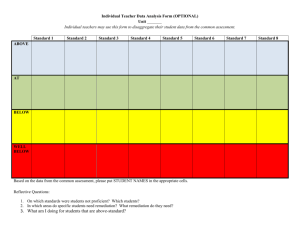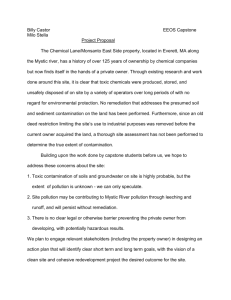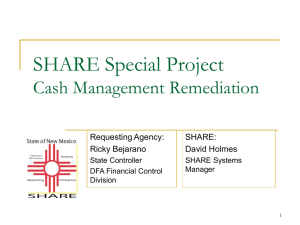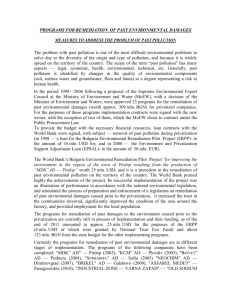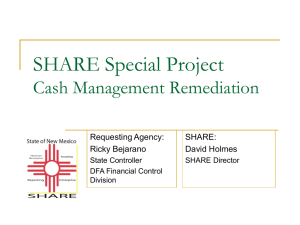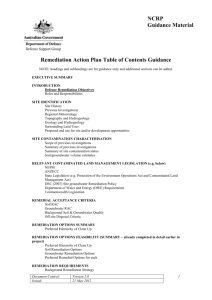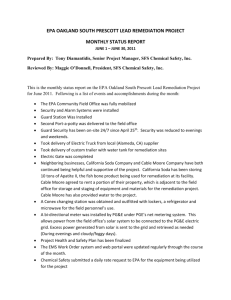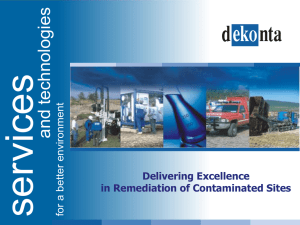Julien Combeau/Clive Walker presentation (MS PowerPoint)
advertisement
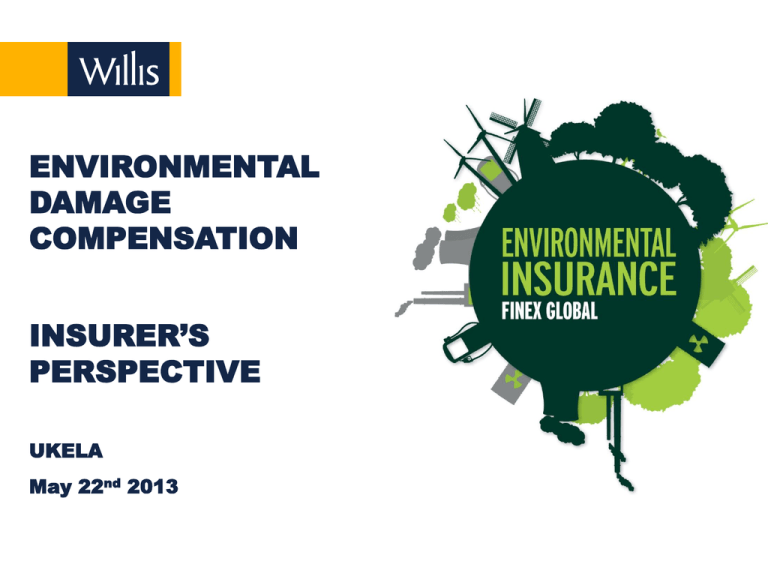
ENVIRONMENTAL DAMAGE COMPENSATION INSURER’S PERSPECTIVE UKELA May 22nd 2013 1 Environmental Insurance policies Administrative Liability Civil / Tort Liability Pollution Condition Environmental Damage 3rd Party: Bodily Injury Property Damage Financial losses Statutory / Public Law offences / Enforced by Regulatory Authority (1st Party) INDEMNIFICATION • Financial Compensation for costs or damage incurred Insured Exposures Covered Locations Covered Operations Transportation Legal Defence Costs REPARATION Direct costs arising from, or reimbursement costs to regulator for undertaking action on insured's before for: On–site, off-site investigation, remediation, removal, clean-up costs Emergency Costs Includes: ELD/EDR (Primary / Complimentary / Compensatory) When it goes wrong Serious pollution incidents in the UK: – 620 in 2011 England & Wales suffer on average two serious pollution incidents a day Half of all serious industrial pollution incidents caused by small businesses*1 Environment Agency continues to call for higher fines for environmental crimes & in 2011 started to use the new civil sanctions regime, outside of courts. 2011 the EA fined 178 companies – Those prosecutions lead to a total of over £3,800,000 in fines only – Average company fine £21,600 *Where the Environment Agency (EA) was able to identify the business responsible Source: Environment Agency, Spotlight on business 10 years of improving the environment Environmental claims management Loss Emergency Measures Investigation of pollution sources Information to Competent Authority Environmental damage assessment Discussion with Authorities Cleanup Works Monitoring Remediation and reparation measures ordered Discussion with Third Parties Loss Adjuster’s mission Undertake Emergency and protection measures Identify pollution sources and root cause Validate remediation scenario Validate Complementary / Compensatory measures Clean-up monitoring and expenses management Lawyer’s mission Transactional phase: Consulting / Information Trial phase: Counsel/ Defence / Subrogation Typical Environmental Damages Costs Emergency costs Investigation and forensics costs Criminal fines or Civil sanctions Legal fees Clean-up costs Primary, complementary or compensatory remediation costs Indemnifications to victims of injuries or distress Indemnifications to victims of property damage Indemnification for disruption caused to neighbouring activities Own-business interruption costs Public relations costs Costs of Remediation Primary Removal of source of damage (e.g., contaminants, physical disturbance) Complementary measures Remedial actions to recover to baseline Planning, engineering, implementing Compensatory Measures Complementary and Compensatory Planning, engineering, implementing Monitoring Valuation methods Equivalency methods (Resources/Resources - REA or Services/Services - HEA) When remediation actions provide the same resources or services as those lost i.e. Hectares of wetland lost = Hectares of wetland gained Value Equivalency methods When cannot remediate the same resources or services, but can remediate similar resources (focuses on human services) i.e. Hectares of wetland lost = kilometres of forest paths Costs can drastically vary depending on the scenarios and proxys As part of the claims management, insurers have a seat on the table and are influencing on methods / scenarios that are presented to local authorities 7 Stakeholders Scientists / NGOs Scientists NGOs Competent Authority To advise on methodologies To monitor on-going work To assess effectiveness Operator / Insurer To comply with regulation To propose and achieve best cost effective solution Competent Authority Operator Insurer Work Contractors To get back to baseline To validate and to control proposed solutions Work Contractors To provide feedback on feasibility To conduct implementation of measures within contractual agreements 8 Environmental Damage Complex issue as it is Collective and accumulative Irreversible in many cases Difficult to determine Claims settlement issues Civil/Tort Liabilities: Indemnifying third parties Monetary award to victim of a loss (bodily injury, property damage) Can be used how the victim wants (to repair or do something else) Settlement can shorten the exposure tail Statutory Liabilities: Restoring the environment Remediation ‘in nature’ to repair the destroyed environment Expenses can run for tens of years until return to baseline 9 Conclusion Environmental Damage can be compensated in many ways Costs can vary depending on Jurisdiction How loss is valuated and the methodologies used Whether civil / tort and statutory liabilities are considered Insurers Have followed regulatory trends instead of resisting against them Are providing ad-hoc proactive products (environmental / EIL insurance) Are paying for claims (but did not suffer lots of ELD-type claims so far…) Now is a good time to transfer environmental risks to insurance as affordable wide coverage is available for what could be complex, long, and costly proceedings and settlements over environmental damages 10 Julien Combeau Executive Director - FINEX Global Environmental Practice Direct: +44(0)20 3124 8046, Mobile: +44(0)7908 240 883, julien.combeau@willis.com 11
